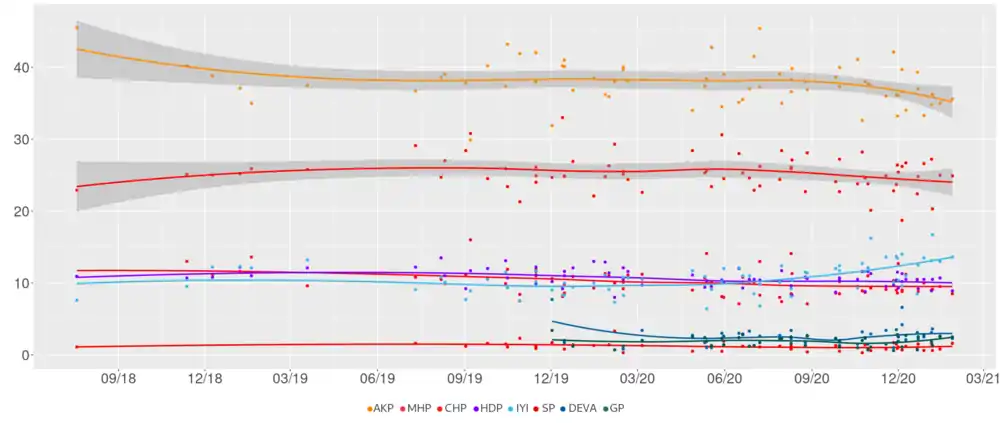2023 Turkish general election
General elections are scheduled to be held in Turkey in 2023. Voters will elect a new president, as well as 600 members of the Grand National Assembly of Turkey, each for a term of five years.
| ||||||||||||||||||||||||||
| Opinion polls | ||||||||||||||||||||||||||
| ||||||||||||||||||||||||||
| ||||||||||||||||||||||||||
Background
Elections of 2018
The previous Turkish general election took place on 24 June 2018. The election marked the country's transition from a parliamentary system to a presidential one, as narrowly endorsed by voters in the controversial 2017 constitutional referendum. That election resulted in a victory for incumbent president Recep Tayyip Erdoğan, who had held the position since 2014. Meanwhile, the ruling Justice and Development Party (AKP) lost its absolute majority in the Grand National Assembly of Turkey for the first time since June 2015, forcing it to rely on its ally, the Nationalist Movement Party (MHP) of Devlet Bahçeli, to pass legislation. The office of the Prime Minister of Turkey was abolished on 12 July 2018, and its last holder, Binali Yıldırım, took office as the Speaker of the Grand National Assembly.
Although there were speculations about a snap election that was supposed to be held in 2023, Bahceli ruled them out. In a written statement, he said that elections would not be held before 2023. He also confirmed that the current coalition between AKP and MHP will remain intact and Erdogan will be their joint nominee for President.[1]
Electoral system
The President of Turkey, who serves as the country's head of state and government, is directly elected through the two-round system, under which a candidate must obtain an absolute majority of votes in order to be elected. If no candidate secures an overall majority outright, a runoff is held between the two most voted-for candidates from the first round, the winner of which is then declared elected. This electoral system was first introduced for the 2014 presidential elections, when it replaced a system of indirect elections under which the president was elected by parliament. The president is subject to term limits, and may serve at most two consecutive five-year terms. However, it has been speculated that incumbent president Recep Tayyip Erdoğan could be eligible to seek a third term in 2023, since the current executive presidential system was only fully implemented after the conclusion of his first term in office, meaning that his period in power from 2014 to 2018 would not count towards his two-term limit.[2]
In order to participate in a presidential election, a candidate must have received the nomination of a political party that either obtained 5% of the vote in the most recent parliamentary election, or that holds at least 20 seats in parliament. Other prospective candidates may still obtain ballot access if they are able to collect signatures from 100,000 eligible voters.[3]
The Grand National Assembly of Turkey is composed of 600 members, who serve five-year terms adjacent to those of the president. These representatives are elected through a form of party-list proportional representation from 87 electoral districts, by the D'Hondt method. The electoral districts largely correspond to the provinces of Turkey, though provinces with larger populations are divided into multiple districts. Specifically, Istanbul and Ankara are each divided into three districts, while Izmir and Bursa are divided in two. Political parties must be officially organised in at least half of the country's provinces (41 or more) and in at least a third of districts in those provinces, and must nominate two candidates in 41 or more provinces, in order to be entitled to seats. Since the introduction of the Constitution of 1982, political parties are also required to pass an electoral threshold of 10% in order to qualify for seats in parliament. Parties that fail to cross the threshold are disregarded for seat allocation purposes.
Individuals who have publicly expressed interest
- Ekrem İmamoğlu the current mayor of Istanbul has publicly said that he could run for president in 2023[4]
- Cem Uzan, former leader of the Young Party (GP)[5]
Electoral districts
|
|
|
|
|
|
|
| |||||||||||||||||||||||||||||||||||||||||||||||||||||||||||||||||||||||||||||||||||||||||||||||||||||||||||||||||||||||||||||||||||||||||||||||||||||||||||||||||||||||||||||||||||||||||||||||||||||||||||||||||||||||||||||||||||||||||||||||||||||||||||||||||||||||||||||||||||||||||||||||||||||||
Candidates and parties
Presidential candidates
 |
 |
 |
 |
 |
| to be determined | to be determined | to be determined | to be determined | to be determined |
| AKP | CHP | HDP | MHP | İYİ |
Contesting parties
| Justice and Development Party | Republican People's Party | Peoples' Democratic Party | Nationalist Movement Party | İyi Party |
|---|---|---|---|---|
295 / 600 |
146 / 600 |
67 / 600 |
49 / 600 |
43 / 600 |
Opinion polls
Parliamentary election

References
- "General elections to be held in 2023, early polls out of question, MHP's Bahçeli says | Daily Sabah". General elections to be held in 2023, early polls out of question, MHP’s Bahçeli says. Sep 7, 2020. Retrieved Dec 23, 2020.
- "Turkey election: Erdogan wins re-election as president". BBC News. 25 June 2018. Retrieved 4 July 2018.
- "VP leader Perinçek reaches 100,000 signatures to run in elections". Hürriyet Daily News. 9 May 2018. Retrieved 4 July 2018.
- "Istanbul mayoral vote: Is 'disastrous' loss beginning of Erdogan's end?". Jun 24, 2019. Retrieved Dec 23, 2020 – via www.bbc.co.uk.
- "Cem Uzan'dan adaylık açıklaması". www.cumhuriyet.com.tr. Retrieved Dec 23, 2020.